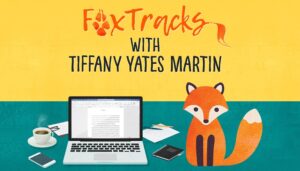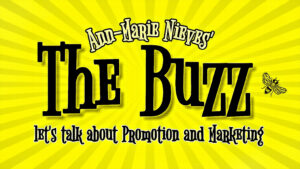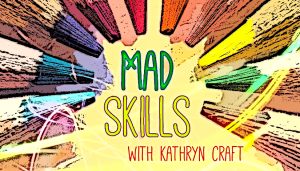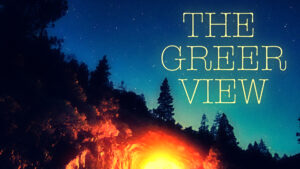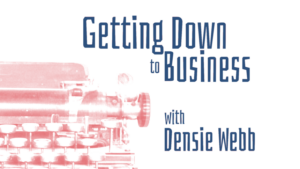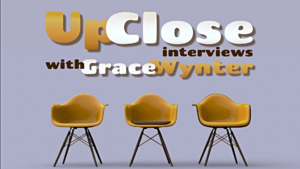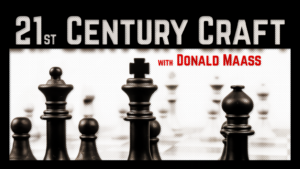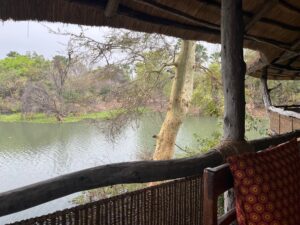REAL WORLD
Therese here. Before we get to today’s regular post, we want to let you know Tiffany Yates Martin’s latest book, The Intuitive Author: How to Grow & Sustain a Happier Writing Career, releases today! Not only that, today’s post features content that’s in line with her book but didn’t make it into the final cut. In Tiffany’s own words:
I love this story, but it echoed a similar one I told about two local restaurateurs who put their whole heart into their pizza-and-pastrami restaurant (odd combination, I know, but man, it works). I wanted to cover a lot of ground in all the areas that are so essential to develop skills and I couldn’t afford anything redundant. But the William Shatner chapter made it in. :) There was no way I was cutting the Shat.
Enjoy, WU community. And congratulations, Tiffany!
Design by Camille LeMoine
Not long ago, the hubs and I and some friends went to see one of my favorite musicians at a space at the Austin City Limits Moody Theater, tickets I’d eagerly stood by to snatch up, finger poised over the “buy” button, the day they went on sale.
The venue was completely sold out. The woman next to us had driven up from Houston because his concerts had sold out there too before she could secure tickets. The fellow fans around me and I excitedly compared venues where we’d seen him, and talked about our favorite past shows and our hope of attending one of his annual fan retreats, while we danced for two hours straight with one another and along with the crowd, most of us singing along to every song.
This is the kind of response any artist might dream about, isn’t it?
But you may never have heard of Eric Hutchinson, the musician in question. The listening room at the Moody where I saw him was, like all the venues where I’ve seen him play, relatively small, maybe 150 people or so. He’s had only three songs even hit the Billboard charts, and his peak position never made it past 29.
I discovered him incidentally about 15 years ago, when I heard one of his singles on the radio, “Rock and Roll,” and as some songs sometimes do, it snagged my attention so hard I immediately went out and bought his entire debut CD (yes, CD), Sounds Like This.
Since then I’ve seen him live every time he’s come through Austin, and bought all his albums. On this tour he took the stage by himself, with three instruments he alternated playing, and that was it. Just a man and his music and a relatively modest number of die-hard fans, who call themselves Hutch-heads.
How a Creative Career Is Built
That night Eric told the story of that first album that had originally turned me into a fan, the 15th anniversary of which was the focus of this tour. He had been trying to make it as a musician, living at home with his parents in between touring, and was just about ready to give up on music as a career when he decided he didn’t […]
Read Morephoto adapted / Horia Varlan
To study writing craft is to learn techniques that support your reader’s perception of its reality. When done well, this provides your reader with an immersive experience.
When done too well, the reader assumes it is the author’s lived experience.
At least that’s true when the writer is a woman, claims B.D. McClay. In a recent New York Times essay, “Sally Rooney Deserves Better Than This,” McClay writes of Rooney (Intermezzo, Normal People): “She’s come to understand herself as having been selected for the role of the voice of a generation by a capricious literary establishment, a role she has neither encouraged nor enjoyed. She believes this has a lot to do with how young women are catapulted to positions of hypervisibility and not anything in particular to do with her books.”
If it were up to Rooney, McClay reports, she’d prefer to divorce her own life from the discussion of her work.
Ah, wouldn’t that be nice, to let your novel stand on its own as do other artworks, allowing readers, critics, and history to make of it what they will without you having to detail every aspect of its inspiration. But that is not our current promotional reality.
Those of us who love the art of story are drawn to the way it inspires us to seek universal truths about issues such as justice, societal responsibility, and how to emerge intact from the thorny interplay between love and loss. But these days, it is often the case that those attending promotional events and book club discussions—despite the fact that what they had chosen to read was fiction—want the facts. What aspect of your life inspired your story’s events? Who inspired this character? Which events really happened?
Don’t they understand that fiction relies on creativity? Or do they ask so as to unlock its mysterious alchemy?
Noting a “tendency to conflate female novelists with their characters,” McClay opines that there seems to be an inequality at play—the assumption that women aren’t capable of using their imaginations to explore, through story, the themes of interest to them.
While I’m not usually quick to hop on the misogyny train, McClay may have a point. Can you imagine someone sitting in a bookstore audience, circa 1900, asking L. Frank Baum which real-life harpy was the inspiration for his iconic villain in The Wonderful Wizard of Oz—even though, in his introduction, he claimed that his novel was written solely to “pleasure children today”? And I can testify that not one reader attending Chris Bohjalian’s 2018 talk in our local bookstore asked him if he’d ever been a flight attendant who woke up covered in the blood of the dead stranger he’d slept with the night before.
Of course genre, not author gender, could be at play in those examples. In her Times essay, McClay quotes interviews in which Rooney claims that she is “not all that interesting.” In a review for USA Today, Clare Mulroy writes that in Intermezzo, which follows two brothers in the aftermath of their father’s death, Rooney continues her exploration of what it means to be […]
Read More
Every time I’ve worked on a novel, I’ve had a vision in my head of the book I wanted to write, the book that could be— if I could bring it to life. And with every book I’ve written up to this point (three published novels, two I started and put aside), I’ve fallen short. There’s always been a ghost book out there, the one that could have been.
Now I’m about to finish a new novel, my fourth. And this time, for the first time, I’ve actually written the book I wanted to write. It’s the best feeling, and to be honest it’s not something I ever thought I’d achieve. The book is still a newborn—I’ve shared it with exactly one other person, my critique partner, and I’m not sure when I’ll be ready to send it to beta readers or my agent. I want to sit with this feeling for a little while, enjoy it before I face the inevitable opinions and feedback and criticisms others will have. And I want to spend some time understanding why this book feels so different. Here’s what I’ve come up with:
I gave up being a pantser. I’ve always been a believer in the old “no surprises for the writer = no surprises for the reader” school of writing. All my earlier books were character-driven, and writing them involved lots of running down one road, smacking into a dead end, turning around, running down a different road, and ending up at a very different destination. It’s a crazy way to travel. This time, I re-read Jessica Brody’s Save the Cat! Writes a Novel, and I followed that 15-beat structure closely. It gave me guardrails, white lines at the side of the road. It kept me honest. And it enabled me to write a story that is both character-driven and plot-driven. It also gave me a much greater sense of control over my work, a sense that the vision I had was attainable, because I had a way to get there.
I wrote the book for myself. I started this project during the pandemic, after five full years of not writing any fiction at all, and almost ten years after I’d finished writing my third novel, which was published in 2013. In 2020 and 2021 I was struggling with a lot of things, as many of us were. When the pandemic began, I became the full-time caregiver for my elderly mother, who died at the end of 2020. I lost a close friendship. Even my beloved cat died. I started writing fiction to write my way out of despair, to create a character who had to figure out what to do when her world fell apart. I kept writing, always with a clear understanding that this wasn’t a project I wanted to discuss with my agent or friends, that maybe it was a book I didn’t even want to publish. I didn’t think about the potential market for the book, or what readers might think if a character said this or did that. I kept writing the book I needed to write to work out my own dilemmas.
Publishing is a crazy world. I still don’t know if this book will be […]
Read More
My last Writer Unboxed essay discussed the impact of reading on the process of writing. Now, I’d like to celebrate the importance of the creators of the books we love, that is, fellow writers. They are, I believe, in part responsible for the words on my page. They aren’t seated beside me at my desk when I write, but they are in my mind, cheering me on, challenging me, and making my books better through their friendship.
In each of the five cities where I’ve lived since graduating from college, I’ve sought out writers. While getting my MFA at Sarah Lawerence, I lived in New York City and made friends through the writing program, as well as after graduation when I worked at a literary agency, and then as an adjunct writing instructor at New York University. Being around other writers who were striving to pen and place their first books made it easier for me to take myself seriously and write my own first novel and find an agent.
In Philadelphia, where my husband and I moved for his career, I taught at the University of Pennsylvania and found fellow writers who also taught writing, as well as neighbors who were poets and novelists. Those friendships kept my writing alive after I gave birth to our two children. I no longer had time to write novels but could work with other women writers to create a journal called Mother Tongue that captured our experience as new mothers.
In Richmond, Virginia, where we moved when our children were two and five years old, I found fellow authors through a fledgling literary non-profit called James River Writers. After attending one or two meetings, I was coaxed into becoming Secretary of the Board and before I knew it, I was chairing the organization. For the following ten years, I helped establish the reputation of the annual James River Writers Conference and substantially grow the membership. Working with other writers to build a strong, vibrant organization that encourages all writers was hugely important to how I saw myself as a writer. My role as a champion for other writers meant I necessarily had to champion myself.
The effort it takes to organize and support other writers takes time away from one’s desk. There are tradeoffs between making art and building a life that supports that art. But I’ve found that putting in the volunteer hours to connect with other writers, interview published authors, publicize other people’s books, all helped me in my career. Each time my books have come out, fellow writers who I’ve helped were happy to spread the word. But I didn’t do my volunteering for that end. The reward was in the conversations about writing that took place along the way: how to make the words sing on the page, how to deal with rejection, how to find time in our busy lives to create, and every other conceivable angle on the best ways to make a writing life.
Most recently, my husband and I moved as empty nesters to the Boston area, where I grew up. We live in Cambridge, the most bookish city I’ve ever known. People here read on the subway, while walking down the sidewalk, and when […]
Read More
Many years ago, as a writer fresh out of grad school, I was precious with my ideas. After each new idea I had for a book, I worried it would be the last good idea I ever had. I swore friends to secrecy before I would even tell them what I was working on; when I found out a friend had shared the manuscript of my first unpublished novel with a mutual friend, I was furious. Not because she hadn’t asked my permission, but because I was struck with fear over what now seems like a silly question: what if that friend steals my idea??
Needless to say, my attitude about ideas has changed over time. I never worry anymore that I won’t be able to come up with an idea ever again. Time has shown me a few things about book ideas in general, and my ideas specifically:
Not all writers work the same way, of course. And having plenty of ideas is not […]
Read More
There were some wins, some losses, and several ongoing battles in the book-banning wars. Will AI replace audiobook narrators—audiobook publishers are trying it on for size. The publishing industry is up, but publishing jobs are down. A website spills all the publishing tea. Amazon’s Kindle Unlimited celebrates a decade of its subscription e-book service. The revolving door in publishing keeps turning and a network for women in publishing will convene in New York later this month.
AI
Generative AI offers a sample of the freaky future in the form of a bodiless podcast
Amazon
Audiobooks
International audiobook publishers say the industry is strong
ACX testing AI program to replicate narrators’ voices
BookBans
How booksellers are taking on book banners
Freedom-to-read advocates want to expand efforts beyond the courtroom
Renewed court challenge in Iowa
A new resolution promoting the freedom to read presented by members of both houses of Congress
Preliminary 2024 report on book censorship
Stephen King books now banned in Florida
Publishers
Lots of moving and shaking in the publishing world.
Publishing Jobs have been disappearing
Overall, the publishing industry was up by 6.2% in June, the most recent stats
Appellate decision upholds the rights of authors and publishers
Authors Guild negotiates closure of TouchPoint Press
The torch of Sam Spade is being passed to prize-winning crime writer, Max Allan Collins
Spilling the tea on publishing
Social Media
Are you on BookTok as a content provider or consumer? Have you noticed any differences in the platform over the last several years?
Read More
The key to getting anything out of essays like this about writing is to tweak the specifics to meet your individual circumstances. While it’s clear who I’m writing about here, the sentiment can apply to nearly anyone or anything. If there’s an external force in your life that you know is hurting you and your writing, do everything you can to simply turn it or them off. The burden won’t go away entirely, but I promise you it’ll ease.
Back in November 2016, on the night that He Who Shall Not Be Named somehow became President Elect of the United States, I was plunged instantly into the worst writing drought of my professional life.
(Oh, right, I probably should’ve started with a trigger warning. If you count yourself among the “Shut up and dribble” crowd, you might want to move along.)
I was well into the first draft of my third novel, LAST COUPLE STANDING. I wasn’t an outliner back then, but I had the plot and character arcs all laid out in my mind. Every time I sat down to work, though, the words simply wouldn’t come. For starters, the sadness I felt—something akin to mourning—had left me listless and completely void of intellectual energy and curiosity. Worse, though, the need to follow the chaos of those weeks and months in real time on social media and cable news had stripped my attention span down to its bare minimum. The country was a continuous car crash, and I couldn’t look away.
As time passed, as the cursor kept blinking, as the pages went unfilled, I knew that if I ever wanted to write another meaningful sentence of prose again, I’d need to make some changes.
Nine years later now (Nine years?!), as we enter what is sure to be among the most distracting months of our lives, I thought it might be helpful to share what I did to get through that administration, a deadly worldwide pandemic, the gutting of the Supreme Court, the stressful election of Joe Biden, a full-on insurrection, the overturning of Roe vs. Wade, the end of President Biden’s re-election bid, and, so far, another ugly political season of constant car crashes.
Turn Him Off
I don’t specifically remember when I decided to never watch HWSNBN again. Whenever it was, though, I’d seen enough to know that watching and listening to him speak for more than ten consecutive seconds had the power to upend my mood, ruin my day, and pulverize any chance I had of getting work done. So, one afternoon in 2017, I told my wife that I was done with him forever. She laughed, assuming I was kidding—or at least exaggerating. I assured her, though, that I was dead serious. I’m happy to report that to this day I’ve kept that promise. I catch bits here and there, of course, because it’d be impossible not to. I haven’t watched a single HWSNBN press conference, though. None of his State of the Union addresses either. No debates, town halls, rallies, interviews, or speeches. No nothing since. I’m a more productive writer for it, and, more importantly, I’m a happier one, too.
Turn Them Off, Too
Turning HWSNBN off was actually pretty easy in retrospect—and downright refreshing. Because, however, […]
Read MoreGreetings, WU Family! Today’s Up Close Q&A features fellow author, editor, and friend Margeaux Weston. I first got to know Margeaux when we were both a part of Sourcebooks’ BIPOC Editorial Training Program. Even back then, Margeaux displayed a keen eye for shaping stories, so I wasn’t surprised when she soon landed an agent, published a non-fiction title with Hachette, and became an acquisitions editor. Today Margeaux shares the wisdom she’s gained along her journey and provides a valuable behind-the-scenes look at the publishing industry.
GW: I’m a fan of origin stories, and though origin stories are usually used to describe superheroes, I love to use the term with published authors. What’s your writer-to-published-author origin story for your debut book?
MW: I love a good origin story as well! Interestingly enough, I started out writing pop culture articles for websites like Ebony Magazine and Paste. In 2020, on the heels of the George Floyd protests, publishers posted openings for for-hire writers. I applied and within a few months I was writing nonfiction books for young readers. It grew from there, and I soaked up all the information I could find about writing and getting an agent. I had a small list of agents I planned to query, including one I really wanted to work with. Two years later, that agent, Eric Smith, tweeted about wanting more nonfiction authors. I sent him my website and talked about my passion for writing for young readers. By that time, I had a few books under my belt and one that was pretty successful. We met and he became my agent soon after.
My journey is a tad bit different than what you’d expect in the querying process. Nonfiction is vastly different from fiction, and obtaining representation is often based on having a specialty or niche style or reputation. Once I had representation, I worked on polishing my proposal. In nonfiction writing, an agent pitches a proposal that includes market research, background information on the author and subject, and chapter samples. Publishers have to envision the “story” and have faith that the writer can deliver. Since becoming agented I’ve published an adaptation, Malcolm X and Muhammad Ali: The Fatal Friendship and have an upcoming nonfiction middle grade book with Bloomsbury.
GW: What do you think was the key(s) to getting that publisher to express interest in your manuscript—in other words, what made your manuscript stand out among hundreds of others?
MW: I’d say it’s a combination of timing and content. I worked in traditional publishing, so I know there are so many amazing manuscripts that come in, but they’re just not the right fit. It could be that the topic isn’t selling as well as it did a few years ago or it’s not what the publisher is looking for at the time. My upcoming nonfiction book with Bloomsbury is about neurodivergent people who shaped the world. That proposal sold at auction, and I believe that happened because the topic is timely and the content has a large appeal.
Read MoreThis month I’m departing from my usual craft advice to share something from the other side of my work as a literary agent, the business of publishing. It starts with a sad story.
The other day a writer pal phoned me. He told me that a third writer whom we both know was upset. An unscrupulous publisher had stolen a story idea of hers, given it to another writer, and now there was a Big Five contract and a movie deal.
I was sympathetic but skeptical. Ideas as such are not subject to copyright protection. Nevertheless, I phoned the Aggrieved Writer (we’ll call her “AW”) and got the full story. First, AW is a published author of a dozen or so books. She was formerly repped by a Big Agency, is repped again by another agent, but the situation in question happened between agents.
For income, AW had been copy-editing for an indie publisher—himself also a former client of the Big Agency. (We’ll call him “TIP”, The Independent Publisher.) TIP suggested that AW write something for him that he could publish. AW mentioned a cute suspense idea she had. Then—the story really starts here—TIP wrote a 10K word outline and AW wrote 30K words of a manuscript.
However, things were not working out financially, so AW discontinued working on the manuscript. AW assumed that the idea and the words which she had written belonged to her. She told me that was the deal.
“Deal? What deal?” I asked. “Was there a contract? Verbal? Written?”
There was a written contract. As we spoke, AW e-mailed the contract to me. I opened it and immediately recognized the type of contract it was. My heart sank. Work-for-Hire. (Shorthanded in the industry as “WFH” or sometimes nowadays styled as “IP” deals, for “intellectual property”.)
WFH
In case you don’t know, WFH is a designation under the copyright law which allows for copyright to be held not by an individual author but by an entity, when the writer is contributing to a collective work. There are nine types of work which can be designated WFH under the copyright law:
Absent from that list are works of fiction. Yes, you read that right. Fiction cannot, under the law, be a WFH. So how are Star Trek and Star Wars novels WFH? How is that allowed? It’s not, but readers want to read, and writers want to write, and publishers want to publish, fiction which is based upon characters and story worlds which have been developed and are, practically-speaking, owned by others. Thus, commissioning tie-in novels as WFH is a longstanding industry practice.
However, there’s a lot you need to know. Take it from this agent.
As far as I know, fiction as WFH has never been tested in the court system. (Attorneys, correct me if I’m wrong.) If it were, I believe that copyright would belong to the author, not an entity, because novels, for instance, are too singly authored to be “collective” works. But hold on, Hollywood attorneys figured that out long ago and so the language of WFH agreements […]
Read More
Do you want to know the truth? My first novel came out last year. I was SO excited to finally have the book out in the world. It took seven years between the first draft and publication. I had a lot of fun meeting writers and readers, because I love talking about stories. I didn’t even mind the promo!
But I was falling apart, struggling with anxiety attacks, and depression. I ended a 16 year marriage. My father got cancer and I moved in to help care for him. He died before the book came out. I also had to navigate deadlines for two careers, single parenting two young children, legal paperwork, and trying to find a place to live in an expensive city, while dealing with an uncooperative ex.
I had minutes to rush my makeup for events. Some days I had to jump from feeding a toddler straight into a Zoom calls. I was filming videos in a corner of my old bedroom in my Mom’s house, and living out of my luggage. I’ve gone to book panels shaking, because I spent so much energy de-escalating a child’s meltdown right before. I was sick constantly thanks to daycare germs. I was a complete mess.
Getting published didn’t change my life, but the story gave me something to look forward to when there was nothing else. I will forever be grateful for the experience.
These days, I’m still struggling. Therapy helps, but it can’t fix the times that I need a break for a few minutes, or the time to eat a proper meal, or when one of my kids is having a tantrum in the middle of a store. My skin has responded to all the stress by breaking out like I’m a teenager again.
I cover up my pimples and put on a smile. I film videos that I don’t rewatch, because I can’t stand to look at myself. I delete a lot of them. Somehow, I still make my deadlines. I keep driving the same rusty old car with a trunk that fills up with water when it rains and pray that it doesn’t die on me. I force myself to take photos of myself, because I lived too long without documentation of my life. I hope that one day, things will be easier, and I won’t have to just pretend that I am ok. I hope that one day I’ll feel more confident, and comfortable in this body, because I have time to take care of myself again.
Can anyone tell I’m just faking it? I don’t know.
I feel guilty that I can’t do more. I want to be present. I want to be productive. But I am so exhausted. I can feel a new story bubbling up inside, but every time I sit down to try and let it out, I can’t. The words feel flat. Nothing seems to work…
And maybe that’s okay? Perhaps this is just my season to grow roots under the dark soil, and not for blooming.
Are there times you couldn’t write? How did it pass?
Read MoreThis past summer I was lucky enough to hike a portion of the Southwest Coast Path in Cornwall, England. Because the dates of my trip changed several times and it wound up being pulled together at the last minute, I did something I’ve never done before: I hired a guide to help me plan it. Her expertise was invaluable – she set up stays at local inns, recommended places to eat, shared daily weather updates, and checked in at the end of each day to make sure I’d made it.
After the trip was over, she requested a zoom call to debrief, and asked whether there was anything I would have done differently. The only thing I could think of was that I wished we’d built in time to see or even attend a show at the Minack Theatre. Carved into rugged stone and perched on a cliff over the water, it is breathtakingly beautiful with madly good acoustics. It was directly on my path, and I’d counted on being able to ramble about the grounds since it was the off season, but there was a production going on that afternoon so the theatre was closed to those not attending. I could have purchased a ticket, but that meant I would still be on the path when it was getting dark, and with hundred-foot drops into the ocean on one side, it wasn’t a scenario I was comfortable with. So with regret I picked up my pack and continued walking, listening as the music from the theatre filled the air for the next half mile.
I shared this with my guide, who was quiet for a moment. “Well,” she said at last. “Sometimes you have to choose. You can be a pilgrim or a tourist, but not both.”
I’ve been turning her statement over in my head ever since, asking which I am in each situation I encounter. Not because it will change what I do, necessarily, but because it allows me to recognize what is important to me, which helps me set priorities.
There’s no shame in either category. Not everything we do is going to call to our soul and ask for a deeper investment of time and energy. And that’s ok.
I’m a tourist, for example, when it comes to my interest in watercolors. A surface level knowledge and understanding is plenty for me at this time, and I’m quick to move on to other activities especially when what I am doing becomes difficult. If the end result of my attempt to paint a bunny looks more like a mutant ninja turtle, I’m mostly okay with that.
But as a hiker, I am a pilgrim. I take delight in the rhythm of the walk, the concentration and endurance it requires to put one foot in front of the next over and over again. The simple state of being on the trail for hours is enough, without the need to do anything else. And I’m invested in my ability to summit certain heights or meet certain goals. If I fail, it matters to me. But I’m willing to take that risk even if it means being humbled.
For me, an activity falls under […]
Read MoreThe view from the Upper Lodge at Mvuu, in Liwonde National Park, Malawi.
I’m sitting in a wicker chair and looking out over the Shire River from the comfort of what is essentially a glorified tree house. It’s been drizzling off and on since my son Caleb and I arrived two days ago. Staff at the lodge here in Liwonde National Park have joked that we brought the rain with us; the wet season in Malawi usually starts over a month from now.
Caleb invited me on this trip, created the itinerary, and paid for everything. I have no responsibilities other than to be a good traveling companion. To that end, I left my computer at home, as naked as that makes me feel, and am equipped only with a powerful set of binoculars and the notebook in which I’m writing these observations. It’s enough. If I record as many sensations and impressions as I can, in the moment, I won’t forget them by the time I return home.
A small yellow bird alights in the nearest tree and I snap to attention: Caleb and I have catalogued all of the birds we’ve seen since we arrived. So far, we’ve added about seventy new species to our life lists with the help of our formidable guide, David.
The lowing of a hippo from across the water distracts me and when I look back, the yellow bird has gone. I hadn’t meant to look — after all, this lodge is called Mvuu, which means “hippo,” because there are so many of them around — but I haven’t been here long enough to feel blasé about hippos, not yet.
No matter, I tell myself. I know the importance of details and I remember enough of them. The bird was about the size of a canary, with a white breast and wings that showed a bright yellow underside when it flew. I turn to my trusty Merlin Bird ID app, punch in the identifying information, and fail to find a perfect match. Was it some kind of weaver? Several species live around here. Or an Eastern Nicator? No, the coloring on this bird is too bright. A Cabanis’s Bunting? No, the breast was white, not yellow.
The nearest I can come is the Village Weaver, but I’m not satisfied. I wish I’d taken note of the shape of its beak and the color of its eyes before I looked away. Some of the birds I’ve seen here have been easy to identify – the Böhm’s Bee-eater, the Lilac-breasted Roller, the Malachite Kingfisher – because they have distinctive colors and shapes. This one, not so much; dozens of birds are similar. Here’s looking at you, convergent evolution.
I pull out the big guns: a 500-page hardback tome called Birds of Southern Africa (Expanded Edition). I turn to the weavers and find several possible candidates based on size and colors. I narrow it down, possibly, to a Spot-backed Weaver. I still have to confirm if they have yellow underwings, so I turn to Google.
Score. Google tells me that the Village Weaver is also known as […]
Read More
